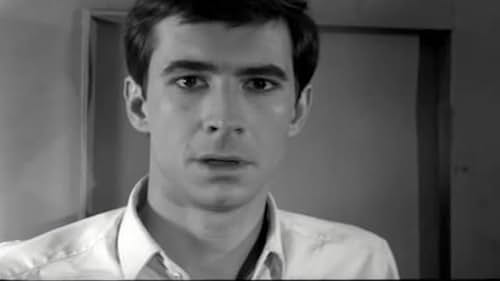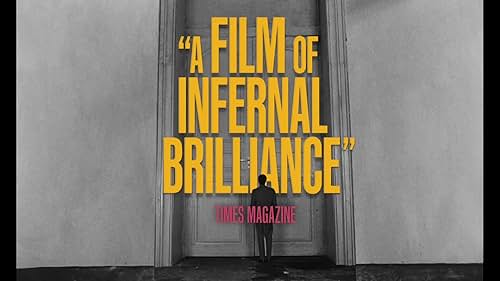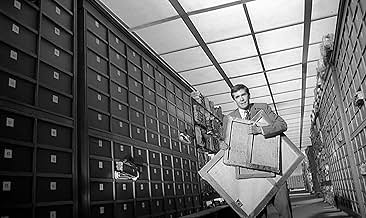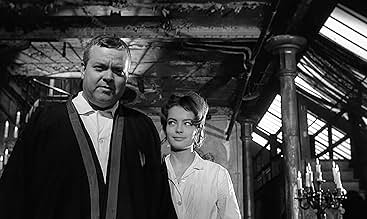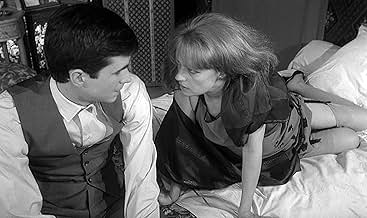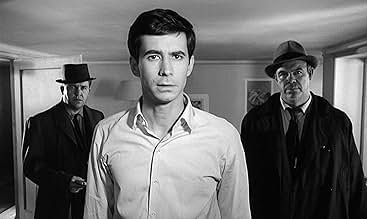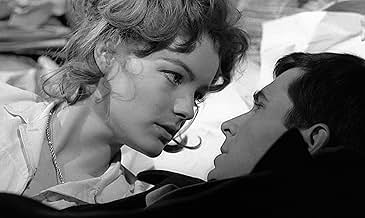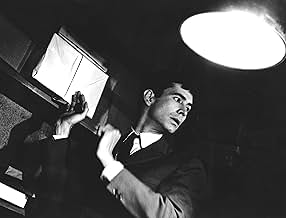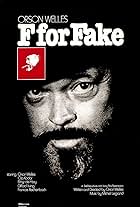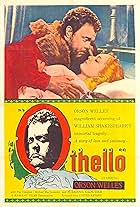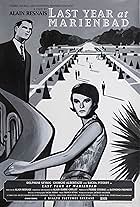An unassuming office worker is arrested and stands trial, but he is never made aware of his charges.An unassuming office worker is arrested and stands trial, but he is never made aware of his charges.An unassuming office worker is arrested and stands trial, but he is never made aware of his charges.
- Awards
- 2 wins & 2 nominations total
- First Assistant Inspector
- (as William Kearns)
- Man in Leather
- (as Karl Studer)
- Director
- Writers
- All cast & crew
- Production, box office & more at IMDbPro
Storyline
Did you know
- TriviaIn May '62, while filming, Jeanne Moreau suffered a slight nervous breakdown due to the stifling atmosphere of the film.
- GoofsWhen Josef K. follows Hilda being carried out of the large trial room/hall by the law student, he hastily grabs and throws on his suit jacket. In the succeeding scenes, the jacket's buttons which are buttoned change.
- Quotes
[first lines]
Narrator: Before the law, there stands a guard. A man comes from the country, begging admittance to the law. But the guard cannot admit him. May he hope to enter at a later time? That is possible, said the guard. The man tries to peer through the entrance. He'd been taught that the law was to be accessible to every man. "Do not attempt to enter without my permission", says the guard. I am very powerful. Yet I am the least of all the guards. From hall to hall, door after door, each guard is more powerful than the last. By the guard's permission, the man sits by the side of the door, and there he waits. For years, he waits. Everything he has, he gives away in the hope of bribing the guard, who never fails to say to him "I take what you give me only so that you will not feel that you left something undone." Keeping his watch during the long years, the man has come to know even the fleas on the guard's fur collar. Growing childish in old age, he begs the fleas to persuade the guard to change his mind and allow him to enter. His sight has dimmed, but in the darkness he perceives a radiance streaming immortally from the door of the law. And now, before he dies, all he's experienced condenses into one question, a question he's never asked. He beckons the guard. Says the guard, "You are insatiable! What is it now?" Says the man, "Every man strives to attain the law. How is it then that in all these years, no one else has ever come here, seeking admittance?" His hearing has failed, so the guard yells into his ear. "Nobody else but you could ever have obtained admittance. No one else could enter this door! This door was intended only for you! And now, I'm going to close it." This tale is told during the story called "The Trial". It's been said that the logic of this story is the logic of a dream... a nightmare.
- Crazy creditsThe end cast credits are read over by Orson Welles without titles (though the actors are read in a different order from their listing on the screen).
- Alternate versionsThe short version cut the opening pin screen sequence and also deleted and rearranged a number of scenes.
- ConnectionsFeatured in The Queen of Sheba Meets the Atom Man (1967)
- SoundtracksAdagio D'Albinoni
Interprété par André Girard (as A. Girard) et Orchestre de l'Association des Concerts Colonne
Arranged by Jean Ledrut
Music by Tomaso Albinoni (T.Albinoni)
Publisher: S.l. : Philips, 1962.
Josef K literally awakes in the first scene, to a nightmare that he cannot understand, because his own sense of justice refuses to let him understand it. This is Josef K's downfall. There are survivors in the world painted by this film, grim survivors to be sure, but survivors none the less. Josef K is not one of them.
Josef K, in the context that surrounds him in this film, is dysfunctional. He has neither the character nor the experience to survive in his world. He seems oblivious to the lunacy of his environment and strives for something so completely alien, that one wonders where and how he even conceived of his morale code, given the world he lives in.
This of course, leads to terrific drama and an odd tension for the viewer throughout the entire film. That tension springs from the dichotomy of the film, Josef K's idealism vs. the cruel reality all around him. Perhaps more specifically the tension arises from Josef K's struggle for logic and reason in a world gone haywire with paranoia and corruption.
One of the minor but important strengths of this film is the encapsulation of its theme within the 2-minute anecdote that starts the picture. This prologue uses stark drawings on a wheel to transition from scene to scene and is both a riddle and a parable. It is accompanied by a sinister cello and a deep, cold narration by Orson Welles. The anecdote in the prologue is a tale of a man who 'seeks admittance to the law'. The riddle that is laid before him ends in death and with the realization that the man wasted his life, seeking a universal truth, to a very personal question.
Much later in the film, the character of the Advocate tries to retell the chilling prologue to Josef K. Josef however, dismisses the fairy-tale immediately. Refusing to hear its lesson and how it applies to his predicament. The advocate rightly notes, from the prologue: 'it has been observed that the man came to the law of his own free will'. What I believe Orson Welles is telling us, in this scene, is he personally believes Josef K's character to be guilty. Josef is not guilty of a crime to be sure, but he is guilty in his conscience. Josef's wretched self-righteousness and guilt-complex is ugly, even within the context of all the injustice, corruption and abuse that surround him.
Josef is weak, stubborn and oblivious and I believe Orson tells us subtly, that perhaps he deserves to die. What is also left unsaid by the Advocate is the man in the prologue willingly submitted himself to the lunacy that became his death. The man felt it better to live chained to an ideal, that to roam free in an unjust world. If there is a crime Josef K is guilty of, then that is likely it.
I have never read the novel, but I believe Josef K, is a much more tragic figure in Kafka's eyes. In the eyes of Orson Welles - it's apparent to me that Orson Welles considers Josef K to be neither tragic nor overly heroic.
While it may contrast strikingly with Kafka's intention, I think Welles tries to illustrate somewhat that Josef K, is not a complete victim. While Josef's surroundings are nightmarish beyond belief, Josef never adapts to them. He never learns how to survive or worse, refuses to learn how to survive. He judges his world but he hardly ever truly interacts with it and he immediately becomes distracted whenever he feels someone has transgressed his moral view of things.
While the actions of Josef K are noble and we sympathize with his plight, you feel little remorse for his eventual death, because Josef quite simply just does not belong. Like the creature at the end of metamorphosis, an innocent thing, is perhaps best left to die, because it is alien to its environment.
Like all good work, that interpretation of mine is open to a lot of debate. Which is another great feature of this film, it provokes a reaction and that reaction can help you understand more about yourself and your current surroundings.
I think this is strong work. Orson Welles finds ways to delight your eyes on screen. Some of the performances like Romy Schneider's performance as the mistress of the Advocate are seductive and chilling.
It is interesting that women in this film are perverted, contorted and shallow. The perversion of society in Josef K's world is so pervasive that his own 16-year-old cousin cannot even visit him, without suspicion from his co-workers. Even sex and passion in this world is twisted into secrecy, innuendo and fear. The only true female survivors in this film are women who willingly cast themselves as supplicants to men of power and intrigue. While this message may affront those who are sensitive, it adds another element to the nightmare that makes this film so strong.
The film has a similar parallel to the Bicycle Thief in my opinion. The protagonist is sympathetic but is surrounded by injustice and cruelty that shreds his very existence. In both films, no amount of effort on the protagonist's behalf will solve his dilemma. Both characters struggle to come to terms with their tragic plight. Like Antonio, Josef K's quest is futile and his only salvation is acceptance. Unlike Antonio however, Josef K never truly transforms, he will not sink to the same level as the world around him. This is why we feel so sorry for Antonio at the end of the Bicycle Thief but see the Trial's ending as more inevitable than tragic.
It is sometimes hard to feel sorry for a martyr who wears his thorny crown so smugly. This is where the protagonist of Josef and Antonio (Bicycle Thief) depart. Josef willingly becomes a self-righteous martyr, while Antonio chooses life, even at the expense of his dignity.
The logic of this film is the logic of a dream and a nightmare. The Trial is a moral nightmare - a world where the only options for survival are: lies, hypocrisy and servitude. A sacrifice, Josef K, refuses to make and so his door closes, forever.
Details
- Release date
- Countries of origin
- Official site
- Language
- Also known as
- The Trial
- Filming locations
- 240 Grada Vukovara Street, Zagreb, Croatia(Joseph K. and old lady lugging a trunk)
- Production companies
- See more company credits at IMDbPro
Box office
- Budget
- $1,300,000 (estimated)
- Gross US & Canada
- $93,533
- Opening weekend US & Canada
- $7,280
- Dec 11, 2022
- Gross worldwide
- $93,688
- Runtime1 hour 59 minutes
- Color
- Aspect ratio
- 1.66 : 1
Contribute to this page


